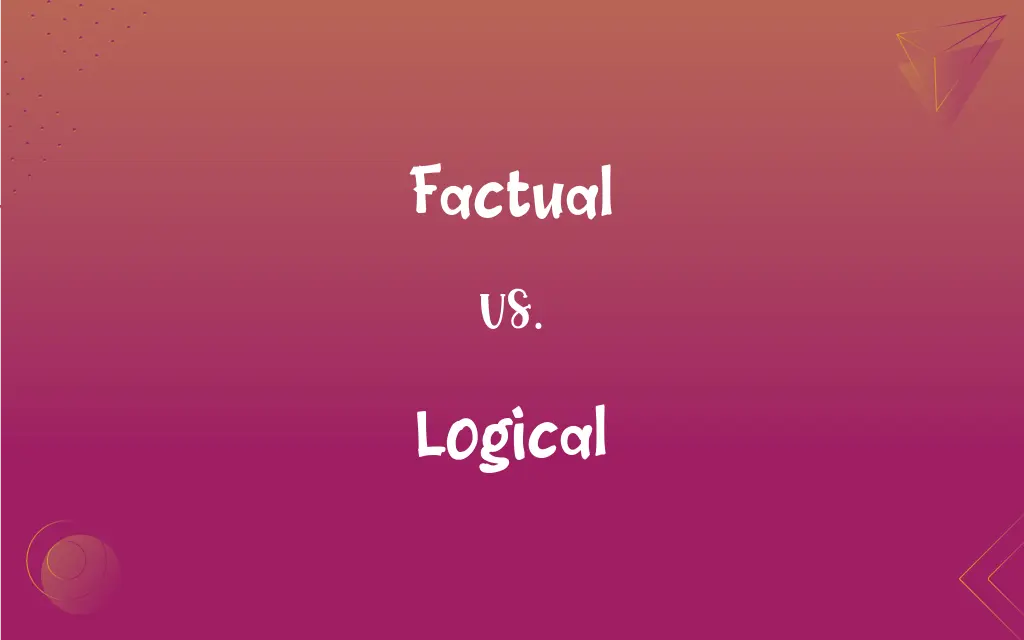Factual vs. Logical: What's the Difference?
Edited by Aimie Carlson || By Janet White || Updated on October 2, 2023
Factual pertains to information based on facts, while logical refers to reasoning conducted or assessed according to strict principles of validity.

Key Differences
Factual and logical are terms that refer to different aspects of cognition and representation of information. Factual implies a representation of information that is based on actual occurrences or realities, being synonymous with truthfulness and accuracy. It deals with information that can be verified through evidence and objective reality. In contrast, logical pertains to the domain of reasoning and is concerned with the structure of arguments and the validity of inferences, primarily focusing on coherence, consistency, and the correct use of reasoning principles.
Delving deeper, factual information is grounded in empirical evidence and actuality. It is objective, undistorted, and unambiguous, relying on tangible proofs and verifiable data. Logical, on the other hand, is more about the relationship between concepts, ideas, or propositions, following the principles of logic to make valid conclusions. It deals with the consistency and soundness of arguments, ensuring that conclusions are derived appropriately from premises, without necessarily being concerned with the factual accuracy of the premises themselves.
To illustrate further, factual statements can be confirmed or refuted based on evidence and reality checks, such as observational data or documented information. They stand as pillars of truth in discussions and debates, providing a concrete base for argumentation. Logical reasoning, however, evaluates the relationships and transitions between different statements or propositions, analyzing the flow of arguments to confirm their validity and soundness, which means a logical conclusion may not always represent a factual truth.
In essence, factual information serves as the backbone for acquiring knowledge about the world, being indispensable in the pursuit of truth and understanding. It ensures that our beliefs and statements are aligned with reality. Conversely, logical reasoning structures our thought processes, allowing us to make sense of information, derive conclusions, and solve problems effectively. It is the mechanism that evaluates the coherence and reliability of our thoughts and beliefs.
While factual denotes a direct correlation with reality and empirical truth, logical is more abstract, focusing on the form and structure of reasoning processes. Factual correctness is paramount in various fields such as science and journalism, where accuracy and truth are critical. Logical reasoning is foundational in domains like mathematics and philosophy, where the rigor and validity of thought processes are essential for building coherent and consistent theoretical frameworks.
ADVERTISEMENT
Comparison Chart
Definition
Related to facts and reality.
Pertaining to correct reasoning.
Focus
Accuracy and truthfulness.
Validity and coherence of reasoning.
Application
Used in conveying verifiable information.
Applied in structuring and assessing arguments.
Verification
Can be verified through empirical evidence.
Assessed through principles of validity.
Nature
Concrete and empirical.
Abstract and conceptual.
ADVERTISEMENT
Factual and Logical Definitions
Factual
Concerned with what is actually the case.
The report must be factual and free of bias.
Logical
Analyzing the structure and validity of arguments.
Logical analysis is crucial in philosophical debates.
Factual
Based on facts.
His account was purely factual, without any interpretation.
Logical
According to the rules of logic.
Her argument was clear and logical.
Factual
Pertaining to the use or possession of facts.
The factual content of the book was praised.
Logical
Pertaining to the correct and structured application of reasoning.
A logical approach to solving problems is always beneficial.
Factual
Representing the truth or actuality.
A factual statement can be proven to be true.
Logical
Characterized by or capable of clear, sound reasoning.
It is logical to assume that bigger houses cost more.
Factual
Of the nature of fact; real.
Logical
In accordance with the principles of logic.
His conclusions were logical and unassailable.
Factual
Of or containing facts.
Logical
Of, relating to, in accordance with, or of the nature of logic
Logical disputation.
Factual
Pertaining to or consisting of objective claims.
Logical
Based on earlier or otherwise known statements, events, or conditions; reasonable
Rain was a logical expectation, given the time of year.
Factual
True, accurate, corresponding to reality.
Logical
Reasoning or capable of reasoning in a clear and consistent manner
A very logical person.
Factual
Of or pertaining to facts; as, factual inaccuracies.
Logical
(not comparable) In agreement with the principles of logic.
Factual
Containing only facts (as contrasted with opinions or speculations); as, a factual report.
Logical
Reasonable.
Factual
Of the nature of fact; having actual existence;
Rocks and trees...the actual world
Actual heroism
The actual things that produced the emotion you experienced
Logical
(not comparable) Of or pertaining to logic.
It's not logical, it's God!
Factual
Of or relating to or characterized by facts;
Factual considerations
Logical
(computing) Relating to the conceptual model of a system rather than its physical expression
Logical memory appears contiguous to an application program, but may well be stored on several physical devices, including in RAM and on hard-disks, as determined by the operating system.
Factual
Existing in fact whether with lawful authority or not;
De facto segregation is as real as segration imposed by law
A de facto state of war
Logical
Of or pertaining to logic; used in logic; as, logical subtilties.
Factual
Based on fact;
Factual accuracy
A factual account
Logical
According to the rules of logic; as, a logical argument or inference; the reasoning is logical; a logical argument; a logical impossibility.
Factual
Characterized by fact;
The factual aspects of the case
Logical
Skilled in logic; versed in the art of thinking and reasoning; as, he is a logical thinker.
Factual
Relating to or characterized by facts.
The documentary provided a factual overview of the event.
Logical
Capable of or reflecting the capability for correct and valid reasoning;
A logical mind
Logical
In accordance with reason or logic;
A logical conclusion
Logical
Marked by an orderly, logical, and aesthetically consistent relation of parts;
A logical argument
The orderly presentation
Logical
Based on known statements or events or conditions;
Rain was a logical expectation, given the time of year
Logical
Capable of thinking and expressing yourself in a clear and consistent manner;
A lucid thinker
She was more coherent than she had been just after the accident
FAQs
Is logical reasoning subjective?
Logical reasoning follows objective principles of validity and coherence, so it is not subjective.
Can a statement be both factual and logical?
Yes, a statement can be factual, representing a true fact, and logical, following correct reasoning.
Are factual statements always true?
Factual statements are based on facts and are considered true if they align with reality and can be verified.
Is factual information objective?
Yes, factual information is objective as it is based on verifiable facts and actual occurrences.
Can logical conclusions be false?
Yes, logical conclusions can be false if they are derived from false premises, despite correct reasoning.
Can a logical statement be unverifiable?
Yes, logical statements may be unverifiable if they concern abstract concepts or theoretical scenarios.
Can factual information change over time?
Some factual information may change as we acquire more knowledge and our understanding of the world evolves.
Is logic based on fixed principles?
Yes, logic is based on fixed principles that define the structure and validity of reasoning.
Is logical reasoning essential in mathematics?
Absolutely, logical reasoning is foundational in mathematics to derive conclusions and prove theorems.
Is factual accuracy crucial in journalism?
Yes, factual accuracy is paramount in journalism to maintain trust and integrity.
Is factual information free from bias?
Factual information should be free from bias, but the interpretation or presentation of facts can be biased.
Can logical reasoning lead to discovery of new facts?
Logical reasoning can help in formulating hypotheses and theories that may lead to the discovery of new facts.
Can factual statements be disputed?
Factual statements can be disputed, but they can be verified or refuted through evidence and reality checks.
Are factual representations devoid of emotions?
Factual representations focus on truth and accuracy and should be devoid of emotions and subjective interpretations.
Can logic be empirical?
Logic is more concerned with the structure of reasoning, but empirical observations can inform logical arguments.
About Author
Written by
Janet WhiteJanet White has been an esteemed writer and blogger for Difference Wiki. Holding a Master's degree in Science and Medical Journalism from the prestigious Boston University, she has consistently demonstrated her expertise and passion for her field. When she's not immersed in her work, Janet relishes her time exercising, delving into a good book, and cherishing moments with friends and family.
Edited by
Aimie CarlsonAimie Carlson, holding a master's degree in English literature, is a fervent English language enthusiast. She lends her writing talents to Difference Wiki, a prominent website that specializes in comparisons, offering readers insightful analyses that both captivate and inform.































































